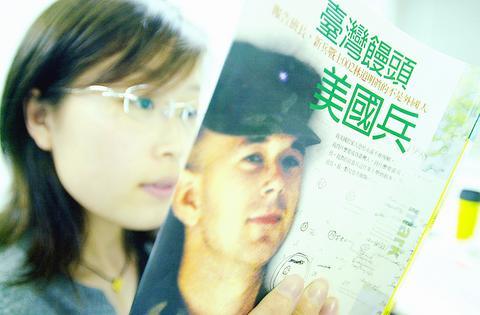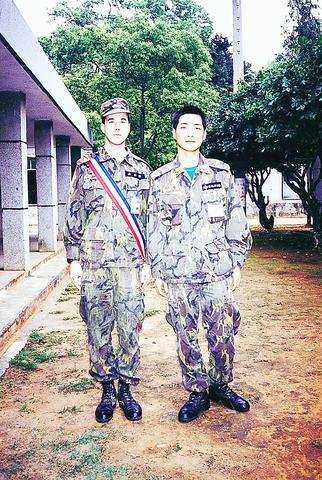For most Taiwanese men, military service is a common experience and one of the most popular topics in conversations when meeting new acquaintances or getting together with old friends.
It is not something that most foreign men in Taiwan would be able or willing to talk about -- unless that foreigner happens to be an American called T. C. Locke.

PHOTO: TAIPEI TIMES
Locke, whose Chinese name is Lin Dao-ming (

PHOTO: COURTESY OF T.C. LOCKE
Despite his obvious distinctness, Locke's experience -- as told in his recently published book, Counting Mantou: An American in the Taiwanese Army -- was much the same as that of other conscripts. In his retelling of those common experiences, Locke manages to transcend the cultural and ethnic differences, making him, in Taiwanese eyes, "one of us."
Locke was not the first naturalized foreigner to serve in the Taiwan military. What makes him different from his predecessors is that he is willing to share his experiences with the public.
In a recent interview, Locke said that he considers Taiwan as his home and that his military service here could have been "the most important part of my life."
Locke's experiences in the military are not so different from those of other conscripts who went before him. After all, life in the military does not really change that much over the years.
As a draftee, Locke first had to receive several months' basic training at a boot camp in Hsinchu. Days at the boot camp are vividly remembered by most conscripts because of constant yelling from drill sergeants who have a reputation for dishing out a steady diet of verbal abuse
At the boot camp, Locke had his first experienced with political education -- military style. The curriculum included a watching a weekly TV program and writing a short essay that would be read by his commanding officers.
Watching the weekly political education program is compulsory for service members of all ranks and is a practice which has been enforced for several decades.
The program, essentially military propaganda, runs each Thursday morning on television station CTS, which is owned and controlled by the Ministry of National Defense.
For most conscripts, including Locke, the program is very boring but still welcome because it provides a 90-minute escape from daily chores.
Writing a short essay each week is another part of the political education. The job did not seem to be difficult for Locke, since he was able to write in Chinese.
One of the essays Locke wrote at the camp was called How to Prevent Escapes from Happening. In the essay, Locke wrote that there were, of course, service members who wanted to escape. However, he wrote, if all the rules were fair and reasonable, no one would feel a compelling need to attempt an illicit escape.
The political education Locke received at the boot camp stayed with him for the rest of his service. But what he experienced after the boot camp is the part most conscripts talk about among themselves, even many years after they have been discharged.
After the boot camp, Locke was assigned to an army division in Miaoli and thus began his life as a regular soldier.
Like any other rookie soldier who reported to his unit, Locke experienced that first night what most new soldiers feared: "the shock and awe education."
This initiation ritual visited upon the newcomers by the senior soldiers has been around for many years and is almost the same from one unit to another across the three services.
On the night the rookie soldiers arrive at their posts, the senior soldiers would ask these recruits to unpack all their personal belongings for inspection and to do as many push-ups as possible.
Such practices, though technically not allowed, has been tolerated in the military since commanding officers are few in number and have to rely on senior soldiers to help keep things going.
Locke does not complain about the practice, which seems to him to be only part of the process of becoming accepted in the military.
"Military service helped me learn how to deal with things. I met both bad guys and good guys in the military," Locke said.
"I learned from the military the spirit of comradeship and cooperation," he said. "This spirit seems to be missing from people outside the military."
Another observation that Locke makes is that the Taiwan military has copied a lot from the US military, but only superficially.
"The Taiwan military is in essence still a Confucian hierarchy," he said.

Prosecutors in New Taipei City yesterday indicted 31 individuals affiliated with the Chinese Nationalist Party (KMT) for allegedly forging thousands of signatures in recall campaigns targeting three Democratic Progressive Party (DPP) lawmakers. The indictments stem from investigations launched earlier this year after DPP lawmakers Su Chiao-hui (蘇巧慧) and Lee Kuen-cheng (李坤城) filed criminal complaints accusing campaign organizers of submitting false signatures in recall petitions against them. According to the New Taipei District Prosecutors Office, a total of 2,566 forged recall proposal forms in the initial proposer petition were found during the probe. Among those

ECHOVIRUS 11: The rate of enterovirus infections in northern Taiwan increased last week, with a four-year-old girl developing acute flaccid paralysis, the CDC said Two imported cases of chikungunya fever were reported last week, raising the total this year to 13 cases — the most for the same period in 18 years, the Centers for Disease Control (CDC) said yesterday. The two cases were a Taiwanese and a foreign national who both arrived from Indonesia, CDC Epidemic Intelligence Center Deputy Director Lee Chia-lin (李佳琳) said. The 13 cases reported this year are the most for the same period since chikungunya was added to the list of notifiable communicable diseases in October 2007, she said, adding that all the cases this year were imported, including 11 from

China might accelerate its strategic actions toward Taiwan, the South China Sea and across the first island chain, after the US officially entered a military conflict with Iran, as Beijing would perceive Washington as incapable of fighting a two-front war, a military expert said yesterday. The US’ ongoing conflict with Iran is not merely an act of retaliation or a “delaying tactic,” but a strategic military campaign aimed at dismantling Tehran’s nuclear capabilities and reshaping the regional order in the Middle East, said National Defense University distinguished adjunct lecturer Holmes Liao (廖宏祥), former McDonnell Douglas Aerospace representative in Taiwan. If

The Mainland Affairs Council (MAC) today condemned the Chinese Communist Party (CCP) after the Czech officials confirmed that Chinese agents had surveilled Vice President Hsiao Bi-khim (蕭美琴) during her visit to Prague in March last year. Czech Military Intelligence director Petr Bartovsky yesterday said that Chinese operatives had attempted to create the conditions to carry out a demonstrative incident involving Hsiao, going as far as to plan a collision with her car. Hsiao was vice president-elect at the time. The MAC said that it has requested an explanation and demanded a public apology from Beijing. The CCP has repeatedly ignored the desires